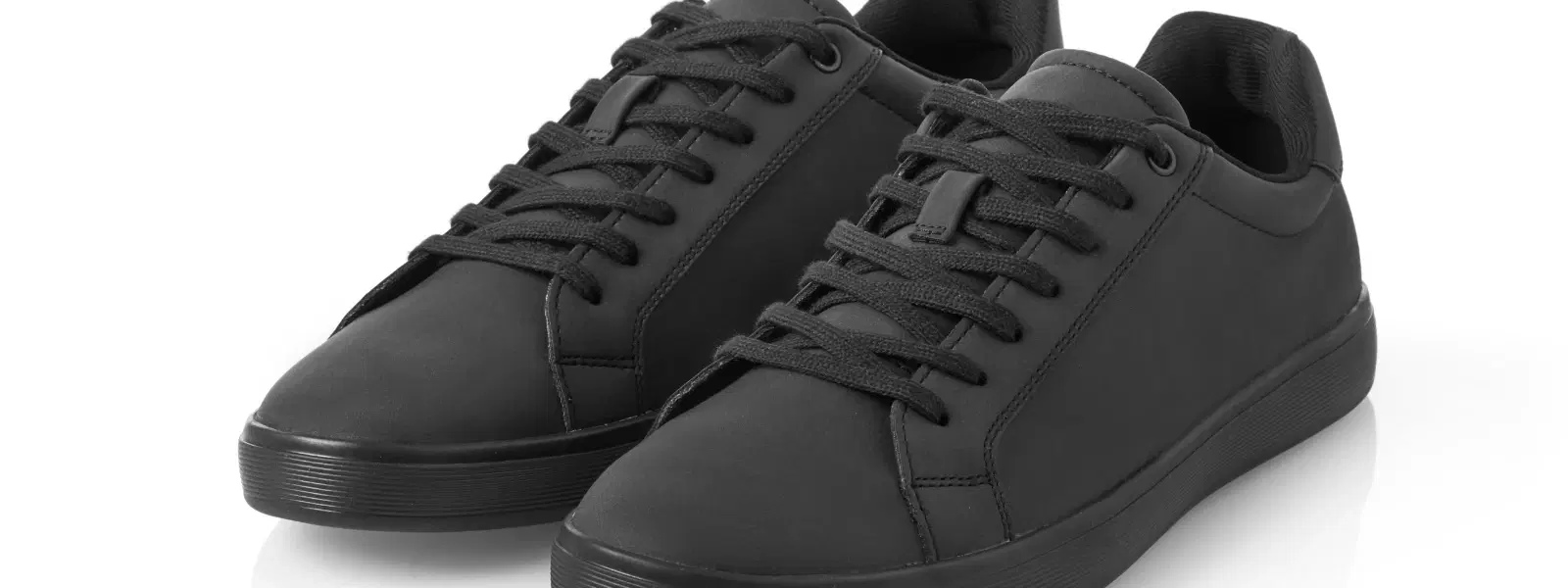
Footwear Guide
•05 min read

Sustainable fashion is evolving rapidly, and footwear is no exception. Today, many consumers seek options that match their values and lifestyle. Your footwear is an expression of your unique personality and style. In this guide, we explore the nuances between sustainable footwear and vegan sneakers. By the end of this guide, you will gain clarity on the key differences between these innovative choices. You will learn how eco-friendly shoes and ethical footwear can help reduce your carbon footprint and support responsible fashion.
Sustainable footwear refers to shoes crafted with environmental and social responsibility in mind. These shoes focus on waste reduction by using organic and recycled material shoes. Brands committed to responsible fashion use eco-friendly materials like organic cotton, natural rubber, and plant-based textiles. In addition, ethical footwear production ensures fair labor practices and focuses on long-lasting, repairable products. These practices are widely supported by current sustainable fashion research. This focus not only reduces waste but also gears the product toward a circular economy with recycling and take-back programs.
Key characteristics of sustainable footwear include:
Use of eco-friendly materials, minimizing harmful environmental effects.
Ethical production ensuring fair labor practices across the board.
Durability and repairable designs that lessen the frequency of shoe replacement.
Adoption of circular economy practices such as recycling and take-back initiatives.
Unlike conventional shoes, sustainable footwear avoids synthetic and non-biodegradable components. This focus helps reduce environmental impact during both production and disposal phases, making them an optimal choice for those who value eco-friendly shoes and carbon-neutral footwear alike.
Vegan sneakers bring a fresh, cruelty-free twist to your wardrobe, letting your style speak volumes. These shoes resonate with customers who wish to ensure their style is cruelty-free. The absence of leather, wool, or any animal-based components sets them apart. However, it is also important to note that the environmental impact of vegan sneakers may vary. While certain pairs incorporate recycled plastics or plant-based textiles, others may use synthetic materials which could detract from their eco credentials.
Key characteristics of vegan sneakers include:
The complete omission of animal-derived components, promoting cruelty-free fashion.
Certification by relevant bodies, emphasizing a commitment to ethical production.
Use of synthetic or recycled materials, with varying degrees of sustainability.
Designs that balance style and comfort, appealing to trend-conscious buyers looking for comfortable eco shoes.
Vegan sneakers offer a unique blend of style and ethical responsibility. Although they guarantee a cruelty-free approach, their overall sustainability depends on the materials used. Balancing aesthetics with environmental benefits remains a key conversation in the world of vegan sneakers.
One of the critical factors in any sustainable fashion choice is the material used. Sustainable footwear and vegan sneakers often have distinct materials, each with its own environmental implications.

Sustainable footwear focuses on incorporating materials that reduce environmental harm:
Organic Cotton: Grown using fewer pesticides and less water, it is a natural alternative to conventional cotton.
Natural Rubber: A renewable and biodegradable material, ensuring long-term environmental benefits.
Plant-Based Textiles: These innovative materials, often derived from fruits or algae, represent the latest trend in eco-friendly shoes.
Recycled Materials: Utilizes repurposed resources such as recycled plastics or old textiles to create durable walking shoes and other footwear.
These materials not only reduce reliance on non-renewable resources but also contribute to a reduction in waste. Industry experts have noted these trends in material innovation.
Vegan sneakers, while focusing on cruelty-free production, may employ a different set of materials:
Synthetic Alternatives: Though innovative, these are often petroleum-based and can be less eco-friendly.
Recycled Plastics: They serve as a sustainable choice by reusing materials, but may pose challenges as they are non-biodegradable.
Plant-Based Leather: Made from sustainable sources such as mushrooms or pineapple fibers, these present a truly eco-friendly option for the vegan market.
The divergent materials used in each type of footwear highlight key differences in environmental impact and overall sustainability.
Insight Corner: Dual Sustainability
Did you know? Many sustainable shoe brands have embraced a dual approach by integrating plant-based textiles and recycled materials together. This strategy allows them to create products that are both cruelty-free and eco-friendly, achieving a balance between style and responsibility.
Sustainable footwear is designed for longevity. These shoes aim to offer repairable designs and robust construction to withstand daily wear. The focus on durability means that sustainable footwear often comes with sustainable shoe care tips that include regular cleaning with eco-friendly products, appropriate storage, and timely repairs. This extended lifespan not only reduces waste but also ensures that each pair of eco-friendly shoes or durable walking shoes remains a valued part of your wardrobe for longer durations.
While vegan sneakers shine in offering cruelty-free options, their longevity can vary widely. Some pairs boast durability through advanced synthetic materials and innovative designs. However, others might emphasize contemporary style over extended use, leading to quicker wear and tear. This trade-off makes it essential to look closely at product specifications when evaluating vegan sneakers and recycled material shoes for everyday wear.
Proper care is essential regardless of the type of shoe. To extend the life of your sustainable footwear, consider these sustainable shoe care tips:
Use eco-friendly cleaning products to avoid harsh chemicals.
Clean your shoes regularly with soft brushes or cloths to maintain their texture.
Store your shoes in a cool, dry place away from direct sunlight.
Address minor repairs promptly to prevent further damage.
These practices help maintain the shoe's integrity, making them a lasting addition to your collection of comfortable eco shoes.

When deciding between sustainable footwear and vegan sneakers, several factors come into play. Begin by considering the overall environmental impact. For those who prioritize green practices, looking for carbon-neutral footwear and biodegradable sneakers might be key. Think about your ethical values; if cruelty-free production is a priority, vegan sneakers hold significant appeal. Every step you take in these innovative shoes is a reflection of your individuality and commitment to responsible fashion. Style and functionality are also important. Whether you need durable walking shoes for a casual day out or comfortable eco shoes for travel, understanding your lifestyle needs will guide your decision. Lastly, your budget and specific fashion taste can help narrow down choices among organic shoe brands and other ethical options.
Choosing the right retail space to shop for these shoes will also enhance your buying experience. You can find sustainable and vegan footwear on various online marketplaces that focus on eco-conscious offerings. These platforms often bring together a diverse range of collections, from organic shoe brands to innovative recycled material shoes, ensuring that you can find the perfect pair that reflects your style and ethical values.
Sustainable footwear focuses on environmental practices while ethical footwear emphasizes fair labor and cruelty-free production. Eco-friendly shoes and carbon-neutral footwear often overlap with these categories.
Not necessarily; their environmental impact depends on the materials used, such as synthetic versus plant-based options.
Several affordable options are available that align with ethical values. It's best to seek collections that match your specific criteria for both style and sustainability.
Use eco-friendly cleaning products, store them in a dry, shaded area, and have minor damages repaired promptly to extend their lifespan.
Sustainable sneakers are widely available on online marketplaces that focus on eco-friendly options and responsibly manufactured products.
Sustainable footwear and vegan sneakers each offer unique benefits for eco-conscious consumers. While sustainable footwear emphasizes environmental responsibility and long-lasting design with a strong focus on repairability and ethical practices, vegan sneakers prioritize cruelty-free production. Understanding their differences helps you make informed choices based on your values and lifestyle. Embracing either option not only uplifts your style but also supports a commitment to responsible fashion and a greener future.